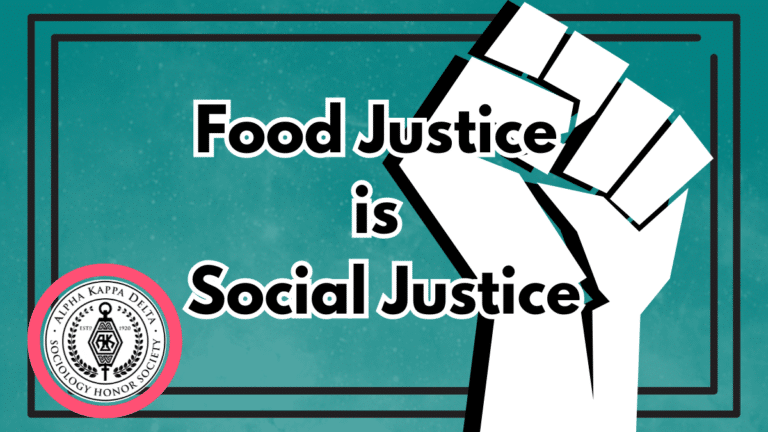
Editorial Note:
This blog feature was compiled by Alpha Kappa Delta’s (AKD) Media Editor, Stephanie Wilson, in celebration of one of 2023 AKD Social Justice Award recipients, Cal State LA AKD Chapter.
Each year, since 2020, AKD has awarded up to three chapters with $1,500 to use toward a social justice initiative on their campus or in their community. In 2023, the AKD Chapter at California State University, Los Angeles–represented by Dr. Roseann Giarrusso, Chair of Sociology—received the award to fund their participation in a food justice initiative.
Continue reading to learn more about how the chapter utilized their award!
Food Justice is Social Justice
Our Social Justice Award stemmed from wanting to enable chapters to identify and implement meaningful change as called for in AKD’s Statement on Racism in America. In 2020-2021, we implemented the Anti-Racism Award Initiative. Chapters were eligible to submit proposals that would stimulate thoughtful discussions of racism and to pursue actions to improve the human condition while addressing some aspect of AKD’s anti-racism statement through this award program.
Following the initial conception of the award, AKD decided to keep this award line; however, we have renamed it to the Social Justice Award and chapters may submit for any theme they deem appropriate. In the case of Cal State LA’s AKD Chapter, they submitted for an initiative focused on food justice.
To learn more about their chapter’s experience with and utilization of the award, our Media Editor, Dr. Stephanie Wilson, reached out for an interview Dr. Analena Hassberg, Associate Professor of Sociology at Cal State LA who was heavily involved in the chapter’s project.
Can you tell me a bit about why your chapter chose to apply for the Social Justice Award in 2023?
We wanted to support our chapter members in having an enriching community based experience.
How did your chapter utilize the award funds?
On Saturday, April 27, 2024, sixteen AKD members from Cal State LA attended a “Healthy Community Day” with Community Services Unlimited, a food justice 501(C)3 non-profit organization that promotes equitable, healthful, and sustainable communities. The event took place at the Paul Robeson Community Wellness Center, a five-thousand-square-foot wellness hub that offers health and wellness programming and houses a full-scale organic market and a thriving multi-generational growing and learning space in South Los Angeles. The organization’s annual Earth Day event fell on the same day, so AKD members interacted with local community members in addition to each other.
Healthy Community Day began with a tour where AKD members learned about the history of the organization, the importance of the marketplace in a food-insecure neighborhood, and the medicinal properties of plants and herbs growing in the garden. They also visited the Sankofa archive and explored hundreds of historical photos, books, and documents detailing the Southern California Black Panther Party’s influence. After the tour, AKD members had the opportunity to plant new seedlings, weed and water the garden beds, and pick up trash around the building and the neighborhood.
Attendees completed a pre-/post-event survey indicating their level of familiarity with food justice concepts to measure how the event impacted their learning and understanding. They also wrote brief reflections on their experience and shared ideas for how to apply what they learned about food to our campus community at Cal State LA.
How did the initiative your chapter carried out implement meaningful change related to social justice?
The event attendees overwhelmingly indicated that this event helped them to better understand food system processes and differential neighborhood food access and health outcomes, and they had lots of great feedback and ideas for improving food access on campus and partnering with community.
What other groups or organizations did your chapter partner with on the initiative supported by the award funding?
We partnered with Community Services Unlimited (CSU), a food justice 501(C)3 non-profit organization that promotes equitable, healthful, and sustainable communities. This event created new opportunities for students at CSU, such as internships and paid/volunteer jobs.
What was your chapter’s experience with compiling the application for the AKD Social Justice Award?
I worked closely with my department chair, Dr. Giarrusso, to complete the application. It went well.
What advice would you offer other chapters preparing to apply for the 2024 cycle of the AKD Social Justice Award?
Make sure to think through all aspects of the process, including how you will measure the success of the event afterwards.